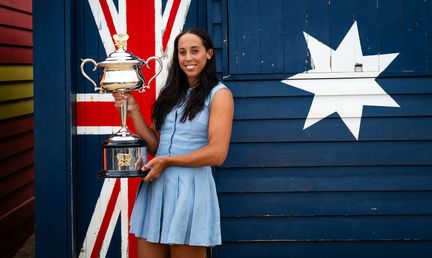The pristine lawns of the well-heeled Queen's Club in southwest London might seem like a curious setting to celebrate the WTA's 50th anniversary. It's one of the longest-standing stops on the ATP Tour, with this week's Cinch Championships dating back to 1881.
But to Ingrid Löfdahl Bentzer, one of the players who was in that famous room at the Millennium Gloucester Hotel when the WTA was founded, Queen's is a site that holds memories of women's tennis as well. The Swede played in the women's tournament that was also held here until 1973. Its final edition, won by Olga Morozova, took place the same week of the meeting.
On Wednesday, exactly 50 years later, Löfdahl Bentzer returned to Queen's to receive a commemorative print of Evonne Goolagong from the 1973 event (above, left to right: youth LTA player Olympia Blanc, former British No.1 Clare Wood, Ingrid Löfdahl Bentzer, WTA president Micky Lawler).
She sat down with wtatennis.com to share her memories from that pivotal week and impart her wisdom to the new generation.
Did you have any idea at the time that you were taking part in something so historic?
Löfdahl Bentzer: Because we never know, it's so easy to look back and say, 'Oh, it's destiny' or whatever. No. It's only with hindsight that it's so wonderful. It was an immensely important day. However, it's the same as when I'm asked, 'What do you remember from Queen's?' I played here twice. I know this club. But I look around now, and I would remember the future.
WTA 50
Serving up a revolution: Billie Jean King and the dawn of the WTA
How Arantxa Sánchez Vicario changed the game for Spanish tennis players
The stroke that separated Justine Henin from the rest
WTA 50: A look back at Serena Williams conquering Madrid's blue clay
WTA 50: How Sharapova transformed her biggest weakness into a strength at the French Open
But we were in a tremendously tough situation. We were always an afterthought [in tournaments]. And you had to have your federation enter you into the Grand Slams. There were so many powers over you, and in the end, we couldn't deal with that. We had to have some sort of power, to be able to do our own things.
We all know about the meeting itself -- the camaraderie, the roles different players played. But what came after it?
Löfdahl Bentzer: We didn't have anything. We didn't even have a tour in place. What do we do now?
We put together a tour starting in Stockholm, Edinburgh and Paris. We started and I was in good form. I beat Evonne Goolagong in Stockholm. But Swedish TV was very upset because that was in the quarters or something. They only started televising it in the semis. "We've seen enough of you, Bentzer! How dare you? You shouldn't have beaten her!" There were publicity implications. It wasn't just about your career.
Then we went to Edinburgh. I was the secretary, and that meant I couldn't play. "Bentzer, you speak many languages, you have an economics degree -- you go in advance, you can't play the other rounds because we need somebody there."
So I didn't play in either of those tournaments. I was there, though, hitting up. Everyone was laughing. "Good that you're not in the tournaments, because you're in your life's form!"
In effect, I was the WTA's first tour director. We didn't even have the terminology then. Someone once told me I was the first, and I said, 'What are you talking about?' Then I realized, maybe I was.
You said that the women players were treated as afterthoughts. What examples were there?
Löfdahl Bentzer: I was a mother. I was playing in Stockholm when my daughter was about 4 months old, before the formation of the WTA. I was breastfeeding her and someone came into the dressing room and said, 'Bentzer, you're on court.' Somebody had hurt themselves so I was on earlier than expected.
I was playing Françoise Dürr, who was then Top 3 or 4 in the world. I was four months after birth and feeding every four hours. But it's what you had to do. I went on court and I won in three really tight sets. My father saved all the clippings then, and according to one I said, 'I'm so glad we finished early, because I'm playing Billie Jean King tomorrow in the semis, and my daughter is not yet a very good sleeper.' I was hoping for a few hours of sleep before playing Billie.
Then I lost to Billie in three tough sets. I was tough on my performance. I would have preferred winning. But the papers said: "Bentzer ran out of steam." Nothing was mentioned about how I was a mother of a 4-month-old. They didn't get it.
Journalists have had to move away from the classical female image and realize, we're athletes. This issue exists in society, but it's especially baffling in sport because of the physical side. We were supposed to tiptoe around, not to speak, not to be aggressive.
But aggressive is good. Aggressive is called assertive, when it's a man.
And then we were playing Fed Cup in Aix-en-Provence in the south of France. I called our federation on behalf of the girls and said, 'Excuse me, sir, could we please have our laundry taken care of by the Swedish LTA?' He said, 'Oh dear! You women, don't you wash your own laundry?' It was on clay, and we had three, maybe four of everything -- for practice, for singles, for doubles, maybe for a warmup -- and there certainly wasn't any money to put it into a launderette somewhere.
At the time, the Davis Cup was a source of income for the Swedish LTA. Why not share it? But that was never in the cards. It was too early. But little by little, it has changed.
Does it feel strange to be getting honored by the tennis establishment you once fought against?
Löfdahl Bentzer: I was very much looked upon as a rebel in my federation. And not with good eyes.
Sport is very conservative. To shift those old things ... when they get shifted, people say, 'My goodness, that wasn't good, we should have done something.' At the time, they said, 'That's the way it is.' The biggest kudos to us who fought the federations was that we dreamt and we dared.
You went on to have an incredibly successful career in sport, working for the ATP and ITF among others. Did the experience of founding the WTA help in terms of giving you the confidence to succeed in a business environment?
Löfdahl Bentzer: No. I've always been rather confident. I tend not to care about a lot of things.
I try to be honest and truthful, and I think it's a bit unnerving for some people. I don't answer to anyone and I don't have any secrets, so no one can threaten me.
I've got to be careful here, because a lot of people don't have the lucky upbringing and childhood I had, with parents who instilled confidence in me. I was born with privilege and they said, 'It's for you to share your privilege.' A lot of people have frightful upbringings.
Among recent WTA players, who have been your favorites?
Löfdahl Bentzer: Ash Barty. She's a lovely, lovely girl. I was very sad when she stopped. Aryna Sabalenka is also a very exciting player. I love her gusto, her spirit. She's a personality.
What wisdom do you want to pass on to the younger generation of women athletes?
Löfdahl Bentzer: It's sad that girls are being curtailed again, I feel. You have to be feminine, you have to [mimics pout]. They all seem to want to be the same, to do the same thing. You have to conform, you have to fit the mold.
For my generation, that's not understandable. Don't go back in the cage. We fought to get you out of the cage -- now stand on my shoulders.
Every generation needs to be very careful and mindful. Look at Roe v Wade in America. Who saw that coming? You have to keep fighting, and every generation has to step up to the plate.
This interview has been edited and condensed for clarity.



![[WC] Sorana Cirstea d. [8] Emma Navarro 7-6(5), 3-6, 7-5, Dubai R3 (3:01). Cirstea held on to notch the 24th Top 10 win of her career and reach the Dubai quarterfinals for the second straight season.](https://photoresources.wtatennis.com/photo-resources/2025/02/19/03a81ffa-191c-468a-8bc0-64546e4aa6e7/Sorana_Cirstea_-_Dubai_Duty_Free_Tennis_Championships_2025_-_Day_4-DSC_6614A.jpg?width=451&height=268)




